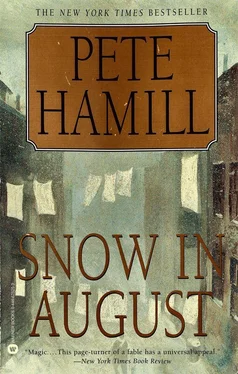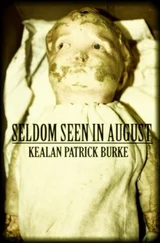Michael told him about the movie starring Boris Karloff as the monster who was created from the parts of dead bodies by Dr. Frankenstein. It played every year at the Venus.
“The Golem,” Rabbi Hirsch said, “was not a movie.”
He talked then about how Rabbi Loew fasted and prayed for three days, purifying his body and his soul. Then one moonless midnight, accompanied by two young and pure assistants, he slipped out of the ghetto through a secret passage. Michael saw him carrying the silver spoon. He noticed that under his coat, Rabbi Loew was dressed completely in white. The three men made their way to the banks of the Vltava. Sweating in silence, they began to shape the body of a man from the pure mud of the riverbank.
Then Michael saw Rabbi Loew take from his jacket a piece of parchment upon which he had written certain words in Hebrew. Letters only he understood. This was called a shem . It included the secret name of God. He inserted the shem in the Golem’s mouth and leaned close to his ear and whispered a secret prayer. With the tip of a pointed tool, he etched a word in the Golem’s brow, a word that Michael could not read. Then Rabbi Loew removed the shem and he and his assistants danced in a circle, moving one way and then another, chanting seven times the secret name of God. Michael could not understand the words.
But slowly, after the mud first turned very red, as if it were baking, and then cooled in a mysterious wind, the Golem rose from the riverbank.
Alive.
“The Golem, he’s almost seven feet tall, his skin is the color of the clay,” Rabbi Hirsch whispered. “He stands up naked on the riverbank and then one of the assistants gives to him a robe. They find out he can’t speak, the Golem, but his eyes, and what he does , tell them he understands everything.”
“Did he understand Yiddish?”
“Of course. And Hebrew. And German. And Czech, and maybe a little Greek too. He understands what he has to understand.”
Shazam!
“It’s like Captain Marvel,” Michael said.
“Who?”
Michael was embarrassed. “A story in the comics.” He leaned forward. “Tell me the rest.”
“The rest?”
“What did the Golem do ?”
Rabbi Hirsch looked uneasy.
“What the Jews need him to do,” he said.
And then, leaning back in his chair, his eyes half-closing, Rabbi Hirsch transported Michael to Prague to witness the doings of the Golem. Michael could see the Golem lumbering through the dark nights to rescue a Jewish girl who was being baptized against her will. He could see the Golem summoning a million birds to darken the skies and shit on the heads of the legions of Brother Thaddeus. He could see the Golem in the shadowed doorway of Brother Thaddeus’s house, filling the locks with mortar, so that for three days and three nights Brother Thaddeus could not get out and his followers could not get in to plot against the Jews.
“Could he make himself invisible?” Michael asked, thinking of Claude Rains in The Invisible Man .
“Sure. If Rabbi Loew says is okay.”
But it was clear to Michael that the Golem sometimes acted without orders from Rabbi Loew. The creature knew he was a soldier in a war, and he had a few personal ideas about how to fight it. Once, the invisible Golem entered the house of Brother Thaddeus on an evening when Thaddeus was entertaining another big Jew-hater from Vienna. The Golem made Michael invisible too, and took the boy along as he moved through the huge kitchen. Michael saw him piss in the wine bottles and switch the serving trays. And then saw the great uproar when the gleaming silver dishes were uncovered on the dining table and Brother Thaddeus and his guests stared down at the roasted remains of rats.
“Great!” Michael shouted, laughing out loud.
“Yes, the Golem, he has a sense of humor,” the rabbi said, looking merry. The Golem had magical powers, he explained, but he was not a god; in some ways he was a large boy.
On another visit to Brother Thaddeus’s house, they saw the hairless monk showing some visiting aristocratic ladies his private art collection, which was housed in a vast gallery full of nooks and crannies. The monk was very rich now, because all of the people who hated the Jews gave him money. Under his robe he wore polished leather boots, just like the Nazis, and they clacked as he walked down the halls. Then Brother Thaddeus turned into one corner, with the perfumed duchess and the silken princess and their ladies-in-waiting rustling beside him. All the time he was delivering a running commentary on the great works of art and his own great taste and how art would be better if only they could get rid of the Jews.
They paused in front of a work that even Brother Thaddeus had never seen before: two giant terra-cotta globes, protruding from a perfect rectangle in the wall. Brother Thaddeus began to expound on the glorious discoveries made in Italy of Etruscan culture, the delicate processes of glazing, firing, aging. The ladies leaned in closer, and then one of them reached forward to touch the terra-cotta globe.
It was soft!
“You see, she touches the Golem’s ass!” Rabbi Hirsch said. “Sticking through the hole he chopped in the wall! And then he gives them — how do you say it?”
He flipped through the dictionary, stopped.
“Effluvium! He puts in the air, effluvium! ”
“A fart!”
“Yes! Yes! A great big fart! And the ladies fall over, like with poison gas, and Brother Thaddeus begins to sob and the Golem runned away, laughing and laughing!”
They laughed together at the image of the Golem’s triumph. And then slowly the rabbi’s face settled. His eyes grew grave.
“Brother Thaddeus, he never gived, gave up,” Rabbi Hirsch said. “But then, a terrible crime he planned. So terrible, this time he must be punished.”
In the week before Passover, a small Christian girl disappeared, and in a dream, Rabbi Loew saw that this was part of a wicked plot for which the Jews, of course, would be blamed. Echoing through the rabbi’s dream were two words: Fünfter Palast . Michael pictured him waking in his candlelit study from the dream, murmuring, “Fünfter Palast, Fünfter Palast…” Then he turned to Michael, played thoughtfully with his beard, furrowed his brow, and said that the words were the key to thwarting the evil intentions of Brother Thaddeus.
Those words, Fünfter Palast, were the name of the ruined Fifth Palace. It had once belonged to an emperor who went mad a century before Rudolf came to Prague. That forgotten emperor imagined all sorts of enemies coming to get him, so he had built a network of secret tunnels from the Fifth Palace to other buildings in the area. He lived to escape. One tunnel even reached into the cellars of the Old-New Synagogue, where he could disguise himself as a Jew and disappear into the fog. Another was connected to the Green Building, where Brother Thaddeus now lived. When the emperor finally abdicated, his enemies destroyed the Fifth Palace. Now the entrances were buried in the ruins, and no maps or plans had survived.
That night, Michael followed Rabbi Loew and the Golem as they dodged spies and policemen in the streets and went to the ruins of the Fifth Palace. The Golem lifted huge slabs of broken walls and collapsed beams, clearing a path, until they found steps leading underground to a sealed door. The Golem ripped the door off its hinges as if playing with a dollhouse. Rabbi Loew stepped inside. Ahead of them lay a dark, damp tunnel. Rats crawled at their feet. Water dripped from the ceilings. Michael saw it all, moving in the darkness of the tale.
Then Rabbi Loew lit two havdalah candles and he and the Golem eased into the tunnel. After a while, they came to a kind of crossroads, where other tunnels led away in different directions. The Golem paused, sniffing the air. Then he indicated with a nod of his head that Rabbi Loew was to follow him into the tunnel to the right. There was a coppery stench in the air. Rabbi Loew looked as if he were entering the outskirts of Hell.
Читать дальше












